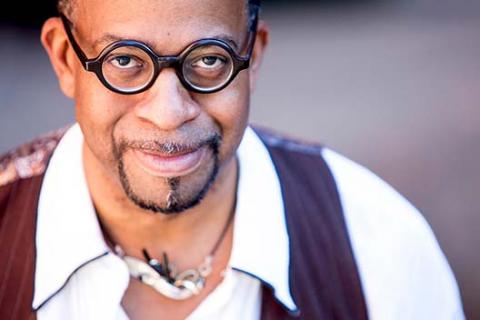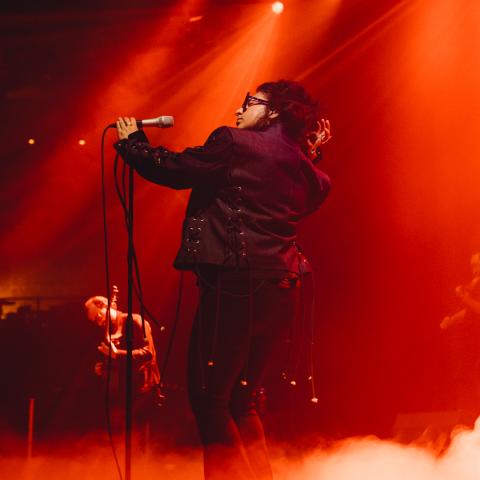Educating Artistic Citizens

Bill Banfield
For music education to have lasting value, it must focus on fostering a committed work ethic among students and inspire them to strive for artistic excellence at every level. In my classes, I stress that music and the other arts are the repository of culture and shed light on the human experience during the time periods in which they were created. It’s vitally important that young people understand that while music is a cherished form of entertainment, it has a greater potential to enlighten listeners. The goal of artistic citizenry should be to understand the power of music and learn how to harness it.
As educators, imparting the social value of music allows us to focus on the richest parts of the educational experience: to challenge and encourage young people to think more expansively. We can guide younger students toward centering their life pursuits on inspiring others to better their lives and the world. Artistic citizens use their talents to present their unique perspective to the public.
During the past decade, Berklee began offering a minor in Africana studies. We have offered a variety of classes, clinics, concerts, film and lecture series and sponsored black music studies professorships with Amiri Baraka, Bobby McFerrin, and Lalah Hathaway. As well, we have invited more than 75 leading artists and scholars in the field including Geri Allen, Dr. Billy Taylor, founding members of the Sun Ra Arkestra, George Duke, Robin Kelley, George Clinton, Sweet Honey in the Rock, Stanley Crouch, Regina Carter, Richard Smallwood, Mint Condition, Maria Schneider, the Clark Sisters, Ty Tribbet, David Honeyboy Edwards, Lionel Loueke ’00, and many more.
In our classes, we take up what I call “ethnomusicologizing.” We look at events in the world of music at large and in culture presently. It’s a form of contemporary ethnomusicology that ponders various types of intercultural relationships, and how they affect music. We think carefully and deeply about the meaning, purpose, and impact of music through the music itself, as well as via the lyrics, images, and social impact. For us, it is cultivating and sharpening creative minds and upholding great music traditions in neighborhoods, cities, the nation, and the world.

Members of the multi-ethnic Webb-Baylor family in Ithaca, NY, lived together harmoniously during the late 1880s. Credit: Photo courtesy of the History Center in Tompkins County, Ithaca, NY
It’s important to expose the rising generation to great exemplars of artistic achievement and to demonstrate how, throughout history, music has had a transformative effect on the world. There are many models of artist citizens that include figures from the recent past such as Woody Guthrie, John Coltrane, Mary Lou Williams, Nina Simone, and Bob Marley, as well as contemporary artists Jill Scott, Kendrick Lamar, Esperanza Spalding, Beyoncé, and others. All have been passionately committed to artistic excellence with no compromises—no matter the cost.
Recently, I’ve read the collected words of saxophonist John Coltrane. In an extraordinary response to an editor’s question about the difficulty in finding a positive philosophy of justification for art, Coltrane answered. “The jazz musician does not have this problem at all. ...We have absolutely no reason to worry about lack of positive and affirmative philosophy. It’s built in us. The phrasing, the sound of the music attest to this fact. We are naturally endowed with it. ...The whole face of the globe is our community. You see, it is really easy for us to create. We are born with this feeling that just comes out no matter what conditions exist. ...Any music which could grow and propagate itself as our music has, must have a hell of an affirmation belief inherent in it. ...It seems history shows that the innovator is, more often than not, met with some degree of condemnation. Change is always so hard to accept. We also see that these innovators always seek to revitalize, extend, and reconstruct the status quo in their given fields. ...They are people who endure great personal tragedy in their lives. Whatever the case, whether accepted or rejected, rich or poor, they are forever guided by that great and eternal creative urge.”
Today more than ever, many feel that creative urge. I think there is an overload in today’s music ecosystem. The culture in which we are producing music is oxygen-starved and doesn’t produce enough income to support the system. It needs rebooting with additional venues, a more equitable share of profits, and a clearer commitment to the core values of art. It should not be based on just getting attention and money. In order for music to survive, the ecosystem needs an equal distribution of thoughtful and informed, creative people providing music (e.g., nutrients), feeders (e.g., the audience), distributors (e.g., entrepreneurs), teachers, and business infrastructure builders.
The image below shows the Webb-Baylor family in Tompkins County, Ithaca, NY, in the late 1880s. They are pictured on family property, with family and friends from neighboring counties. It’s a simpatico group comprising a blend of people of African, native, and Caucasian heritage. On the left are members of the family band who had been Civil War musicians. It captures a successful paradigm of people with different backgrounds coexisting that could be replicated in a new and inclusive music industry. The American equation for culture involves many voices uniting to make a nation.
Like all great art, black music is about the power to move toward human truths, universal ideals that reflect balance, order, beauty, love, justice, and inspiring ideas that change people’s lives. It has always been primarily about black peoples’ lives and preserving culture, directed through extraordinary black performance practices, and tied to the African griot traditions of carrying and critiquing culture, creating community, and caring for society as well. We must be committed to this as performers, producers, conceptualists, teachers, historians of the trade, and participants in the business of music. Most importantly, we must comprehend the real purpose of music: to lift people and transform the world in which we all live.




